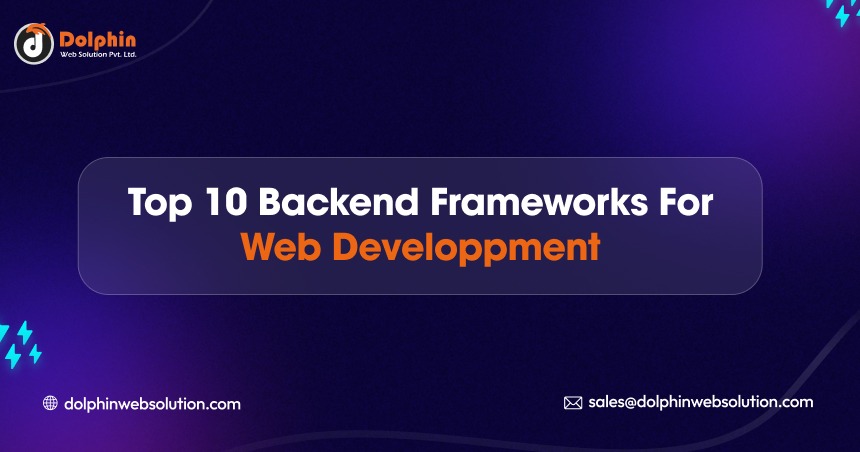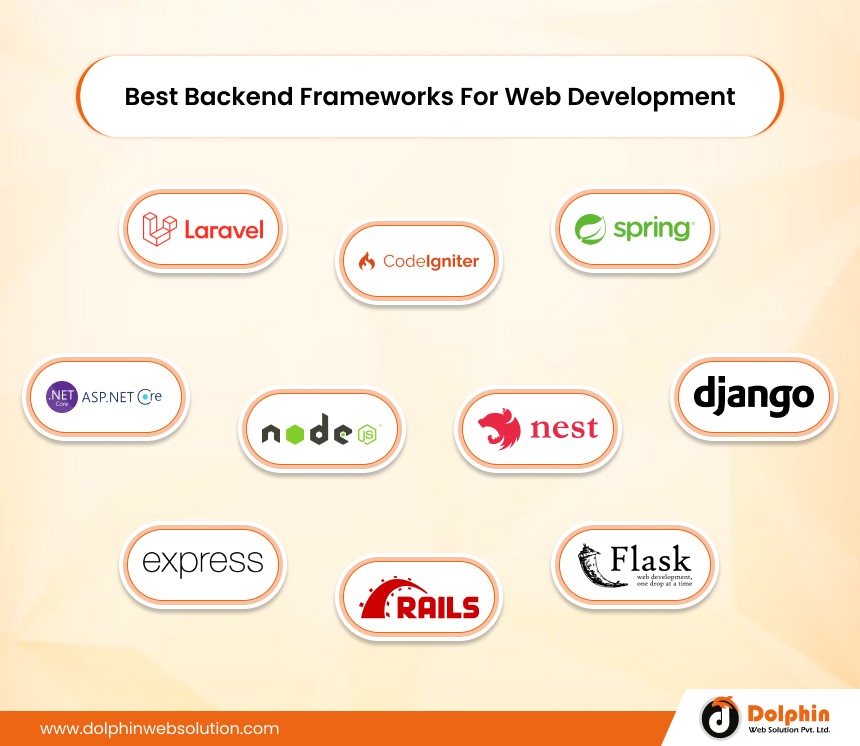Best Backend Frameworks For Web Development In 2025?

Table of Contents
Summary :
The backend is an important part of any website or web application as it handles all the server-side logic and functionality. When developing web applications, using a backend framework can greatly help in cutting down development time and managing complexity. This article discusses some of the best backend frameworks and evaluates them based on different parameters
Choosing the right backend framework is important for web development. This article discusses and compares the top frameworks based on the language used, features, learning curve and other factors. Python frameworks like Django provide robust features out of the box using batteries included approach but can be opinionated. Ruby on Rails and Laravel in PHP emphasize speed and readable syntax. Node.js/Express is lightweight and suitable for real-time apps. Flask balances simplicity and flexibility. For large-scale Java projects, Spring has comprehensive functionality through its various modules. Django, Rails and Spring are best for robust enterprise apps while Laravel, Flask and Express maintain simplicity. Asp.Net is high performance on the .NET stack while NestJs brings advantages of TypeScript. The choice depends on requirements, scale, expertise and language preference..
What Is A Backend Framework?
A backend framework provides a baseline foundation and common functionality for developing the server side of web applications. It allows programmers to build upon pre-existing code rather than developing everything from scratch. Backend frameworks take care of basic activities like routing requests, database management, authentication etc. to allow developers to focus on the core logic and functionalities of their applications.
Best Backend Frameworks For Web Development
Time for the main part of the post where we are going to check with the best backend frameworks for web development. Here we go.

1. Django (Python)
Django is a free and open-source web framework built on Python used to develop robust data-driven websites and web apps. It is highly scalable, secure and popular within the Python community. Django emphasizes the reusability and plug-ability of components.
Pros of Django:
- Batteries included approach with in-built libraries makes it easy to rapidly develop features.
- Object-relational mapper allows for easy management of database interactions without writing SQL queries.
- A large ecosystem with many third-party plugins for additional functionalities.
-Emphasis on security and compliance with standards like GDPR by design.
Cons of Django:
- Can be more opinionated than some frameworks which may hinder customization.
- The learning curve is steeper than some other frameworks due to complexity.
- May be slower than some other options depending upon the specific use case
2. Ruby on Rails (Ruby)
Ruby on Rails is a popular framework optimized for programmer happiness. It follows convention over configuration through its unstructured approach. Rails promotes the usage of best practices by making common patterns easy to implement.
Pros of Ruby on Rails:
- Excellent productivity through scaffolding and automatic CRUD interfaces.
- An unopinionated nature allows flexibility.
- Large community support and third-party plugins.
- Explicit naming and conventions help readability.
Cons of Ruby on Rails:
- The learning curve is initially steeper than some others due to its dynamic nature.
- Performance may not be best suited for large applications.
- Code generation sometimes leads to code bloat issues.
3. Laravel (PHP)
As one of the most popular PHP frameworks, Laravel focuses on simplifying the development process and leverages design patterns like MVC. It provides elegant migrations and database interactions.
Pros of Laravel:
- Clean and elegant syntax promotes readability and rapid development.
- Large community backing and support through comprehensive documentation.
- Blade templating allows the merging of view logic cleanly.
- Facades provide simple access to complex features like caching.
Cons of Laravel:
- The learning curve for larger and more complex projects can be steep.
- The third-party package ecosystem is not as vibrant as other options.
- Opinionated nature may restrict flexibility in specific use cases.
4. ASP.NET (C#/.NET)
ASP.NET lets developers build dynamic data-driven websites using a rich set of controls and components in C#.NET. It follows an MVC pattern and integrates well within the Microsoft Azure ecosystem.
Pros of ASP.NET:
- Seamless C#/.NET integration and high performance.
- Large ecosystem of backend and front-end support frameworks.
- In-built Identity support for user authentication through cookies.
- Flexible hosting options on Windows and Linux.
Cons of ASP.NET:
- Development time may be comparatively higher than other options.
- Not as lightweight as some other frameworks due to features.
- Skill sets are harder to find or transfer outside Microsoft Stack.
5. CodeIgniter (PHP)
CodeIgniter is a light and extensible framework popular for the quick development of small to medium apps. It follows the MVC pattern with simple routing techniques.
Pros of CodeIgniter:
- Very light and fast compared to other heavy PHP frameworks.
- A clean and simple coding style increases readability and understanding.
- Easy set-up and extensibility through additional libraries.
Cons of CodeIgniter:
- Active development has slowed over the years affecting community support.
- Feature sets are less robust compared to larger frameworks for complex projects.
- Documentation and examples are sometimes dated affecting learning.
6. Flask (Python)
Flask is a microframework focused on keeping core functionality simple while still being extensible. It is known for its simplicity, minimalism and flexibility.
Pros of Flask:
- Faster development times as it imposes minimal structure or development constraints.
- Large ecosystem of extensions available for any missing functionality.
- Built-in support for WSGI makes it WSGI-compatible web servers like Gunicorn.
Cons of Flask:
- Requires extra packages and build steps for basic functionalities present out of the box in other frameworks.
- Error handling requires more boilerplate than solutions like Django.
- Scalability needs extra tooling and plugins as the core is lightweight.
7. Express.js (Node.js/JavaScript)
Express.js is a fast, unopinionated and minimalist framework enabling rapid development of web applications and APIs in Node.js. Its routing capabilities are very powerful.
Pros of Express.js:
- A minimal learning curve makes it easy to start with.
- Large ecosystem of extensions available through the npm package registry.
- The use of JavaScript on the front end and back end allows for full-stack development.
Cons of Express.js:
- Lack of developer guidance through conventions may lead to messy codebases.
- Debugging production issues is harder due to the asynchronous nature of Node.js.
- Performance and scalability need extra tooling and middleware like pm2.
8. Node.js (JavaScript)
Node.js is an open-source and cross-platform JavaScript runtime environment that allows building web servers and networking applications. While not strictly a framework, it serves as a foundational platform for server-side scripting used by popular web frameworks like Express.js.
Pros of Node.js:
- Extremely lightweight and fast – suitable for real-time applications and microservices.
- Event-driven and non-blocking I/O model optimizes throughput.
- JavaScript for front-end and backend eases full-stack development.
Cons of Node.js:
- The single-threaded nature makes it not suitable for CPU-intensive tasks.
- Debugging asynchronous code is somewhat difficult compared to synchronous runtimes.
- Security vulnerabilities are more likely due to exposure to server-side JavaScript.
9. NestJS (Node.js/TypeScript)
Nest is a progressive Node.js framework built upon Express and TypeScript with a focus on developer experience. It is based on progressive JavaScript and provides routing, controllers, modules and more goodies out of the box.
Pros of NestJS:
- The opinionated approach helps follow best practices through convention.
- TypeScript support enables static typing for scalability and code quality.
- Modularity and Dependency injection enhance maintainability.
Cons of NestJS:
- The learning curve may be steeper than dynamically typed frameworks.
- Some functionality comes with additional configuration and learning.
- The library ecosystem is still catching up compared to JavaScript in some aspects.
10. Spring (Java)
Spring is an application framework and inversion of a control container for Java that provides infrastructure support for developing robust web applications. Its vast array of modules includes Spring MVC web framework.
Pros of Spring:
- Has almost everything required for enterprise app development out of the box
- Massive ecosystem of plugins for adding functionality
- Integration with all other Java EE specifications
- Inversion of control and dependency injection for loose coupling
Cons of Spring:
- Steeper learning curve than in some dynamic languages
- Heavyweight compared to microframeworks in some use cases
- Evolving specifications may break existing code in future versions
Final Thoughts
The choice of backend framework depends upon factors like programming language preference, scale, features required and developer expertise. For robust and scalable web applications, solutions like Django, Rails and Spring provide comprehensive out-of-the-box functionality. Laravel, Flask and Express maintain a great balance of features and simplicity. Newer options like NestJS offer advantages of TypeScript too. All these frameworks empower developers to focus on core logic while abstracting away tedious technical implementation details. Professional Backend Development Services can help choose and implement the right solution cost-effectively.

Hello!
Click one of our contacts below to chat on WhatsApp


